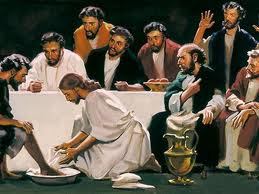
Have you noticed how the hand sanitizer business is booming? We are involved in a mass attack on those “germs” that attach themselves to our hands. Some churches even have convenient hand sanitizers next to the communion stations. Children buy flavored sanitizers in cute, colorful containers. I bet you have a bottle of sanitizer in your purse or your car.
Today we read that Jesus committed the “unforgivable sin” of not using the “hand sanitizer” before he sat down to eat dinner. What had begun as a practical means of cleaning dirty hands had now become a religious ritual—like when the priest does the symbolic washing in the middle of Mass—formerly known as the “lavabo.” Maybe Jesus’ hands weren’t dirty or maybe he was trying deliberately to make a point with his Pharisee host (Luke 11: 37-41).
“After Jesus had spoken, a Pharisee invited him to dine at his home. He entered and reclined at table to eat. The Pharisee was amazed to see that he did not observe the prescribed washing before the meal.”
The Pharisees had turned “hand sanitizing” into a required religious action. So much importance was attached to this ritual that they came to believe that skipping it was equivalent to insulting God. The host was “amazed” that a holy man like Jesus would be disrespectful to God. On the contrary, his behavior was “prophetic” in that it grabbed the attention of the group so as to open them to a word from God. Jesus then went on to elaborate the word.
“Oh Pharisees! Although you cleanse the outside of the cup and the dish, inside you are filled with plunder and evil. You fools! Did not the maker of the outside also make the inside?”
These people would think nothing of ignoring a beggar on the street or criticizing Jesus behind his back, but they wouldn’t dare pass up the sanitizer before they ate. Why, what would people think of them if they bypassed this ritual?
Jesus was in the “heart sanitizer” business. What is more important, germs on the hands or “germs” on the heart? How clean people were on the outside was as nothing compared to how clean they were on the inside. Is a squirrel more concerned about how clean an acorn is on the outside or the nutritious contents of its inside?
Jesus came to “sanitize” the insides of people. He came to do what no human is capable of—to forgive sins and wash hearts with God’s mercy. In the end, our outside “shell” will disintegrate and blend in with the earth. Our spirits, however, live forever. The Pharisee was horrified that Jesus didn’t wash his hands; Jesus was horrified and angered that the Pharisee didn’t really care what his heart looked like—it was covered with “plunder and evil.”
We Catholics are far ahead of the “hand sanitizer” people. In all of our churches with have “heart sanitizers” at the entrances of the building—we call these holy water founts. Though many use this as a mindless ritual, it is intended to be more than that. The power of our baptisms is released in this blessed water. We sign ourselves with the sign of the cross after dipping our fingers in the water. Jesus stands at the door to greet us and to pour out his forgiveness on us in any way he can. Holy water is one way that he cleanses us over and over again. Many have holy water containers in their homes. Are they just sitting there unused or we use them as a way of rejoicing over the healing, forgiving power of the Holy Spirit that releases the various kinds of spiritual “germs” that have attached themselves to our hearts?
Jesus gave the Pharisee a practical step he could take to sanitize his heart.
“But as to what is within, given alms, and behold, everything will be clean for you.”
Jesus was not advocating ignoring the ritual washing. He was letting them know the mind of God. There was something much more powerful to impress him than washing hands. Dig deep in his pocket and be generous with our money as God digs deep in his pocket and is generous with his mercy.
“Cleanse me of sin with hyssop that I may be purified; wash me that I may be whiter than snow” (Ps 51:9).
